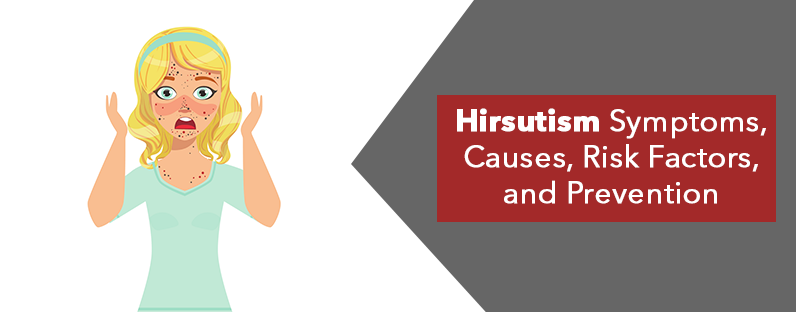Hirsutism
Hirsutism is a condition in women which results in excessive growth of dark or coarse hair in the face, chest, and back of a male-like pattern.
With hirsutism, extra hair growth often arises from excess male hormones (androgens), primarily testosterone. To women seeking to treat hirsutism, self-care approaches and appropriate treatment services are available. In this blog we’ll discuss about the Hirsutism its Symptoms, Causes, Treatment and Prevention tips.
Most women have fine, light, barely visible hair on their faces and body, but occasionally this hair can be thicker and more noticeable.
Around half of all hirsutism people have an abundance of androgens. These hormones normally activate male physically and sexually growth. Women typically have low androgen levels but for a variety of reasons, these levels can differ.
Higher levels may over-stimulate the hair follicles, resulting in more hair growth than a woman normally would.
Hirsutism may occur in anywhere between five and ten per cent of women depending on local and cultural definitions of a “normal†amount of hair.With age, the prevalence increases, particularly after menopause.
Read Also:Premenstrual Syndrome: Symptoms, Risk Factor, and Treatment
Symptoms of Hirsutism
A woman with the mildest form of hirsutism may notice significant growth of hair on the upper lip, chin, sideburn area, and around the nipples or lower abdomen.
This hair will be mature hair or hair that is the same colour as that growing on the scalp.
More advanced hirsutism on the upper back, neck, chest and upper abdomen may cause mature hair to develop, and typically begins during puberty.
If hirsutism begins before or after puberty, the cause may be related to hormonal problems and the symptoms should be examined by a doctor.
A woman suffering from hirsutism apart from excessive hair growth may also experience other symptoms like:
- Deeper voice
- Balding
- Acne
- Decreased breast size
- Increased muscle mass
- Oily skin
- Loss of hair, known as alopecia
- A receding hairline
- Enlarged clitoris
When to see a doctor
Ask your doctor about your treatment options, if you think you have much coarse hair on your face or body.
Excess facial or body hair is often a sign of an underlying medical condition. If you experience extreme or rapid hair growth on your face or body or signs of virilization over a couple of months, see your doctor for evaluation. You might be suggested for a doctor who is specialized in hormonal disorders (endocrinologist) or skin problems (dermatologist).
Causes of Hirsutism
Hirsutism can be caused by:
Polycystic ovary syndrome (PCOS): This situation, which often begins with puberty, is causing sex hormone imbalance. Across the years, PCOS can gradually lead to excess hair growth, irregular cycles, obesity, infertility and at times multiple cysts on ovaries.
Read Also:Polycystic Ovary Syndrome (PCOS) – Symptoms, Causes And Complications
Cushing syndrome: This happens when the body is exposed to an elevated level of the hormone cortisol. It may grow from taking medicines like prednisone over a long period or by your adrenal glands producing too much cortisol.
Congenital adrenal hyperplasia: This hereditary condition is characterized by the adrenal glands producing an elevated production of steroid hormones, including cortisol and androgen.
Tumors. Rarely, an androgen-secreting tumour in the ovaries may cause hirsutism.
Medications. Certain medications may cause hirsutism. Which include minoxidil (Minoxidil, Rogaine); danazol, which is used for endometriosis treatment of females; testosterone and dehydroepiandrosterone (DHEA). When your partner uses topical products containing androgens by skin to skin contact you can be affected.
Hirsutism also occurs without any known cause.
Risk factors
Your likelihood of developing hirsutism can be affected by many factors including:
Family History: Many conditions which cause hirsutism, including congenital adrenal hyperplasia and polycystic ovary syndrome, occur in families.
Ancestry: Women of Mediterranean, Middle Eastern and South Asian ancestry are more likely to have more unrecognizable body hair than other people.
Obesity: Being obese causes excessed development of androgen that may make hirsutism worse.
Read Also:Genital Herpes- Symptoms, Causes, Risk Factors And Prevention
Complications
Hirsutism can be distressing, emotionally. Certain women feel self-conscious about having inappropriate hair. Several may experience depression. Despite this However hirsutism does not cause physical problems, it may also be the underlying cause of a hormonal imbalance.
If you have hirsutism and cycles of irregularity, you can experience polycystic ovary syndrome, which may hinder fertility. Women who take some medications to treat hirsutism should stop pregnancy due to the possibility of birth defects.
Prevention
In general, hirsutism is not preventable. But weight loss if you are overweight may help to minimize hirsutism, especially if you have polycystic ovary syndrome.
Hirsutism can’t always be regulated. However, a healthy, balanced diet and regular exercise can help control weight and reduce the risk of high diabetes and cholesterol levels.
The avoidance of unnecessary medicinal products known to cause hirsutism can also minimize risk.

Leave a Reply
You must be logged in to post a comment.